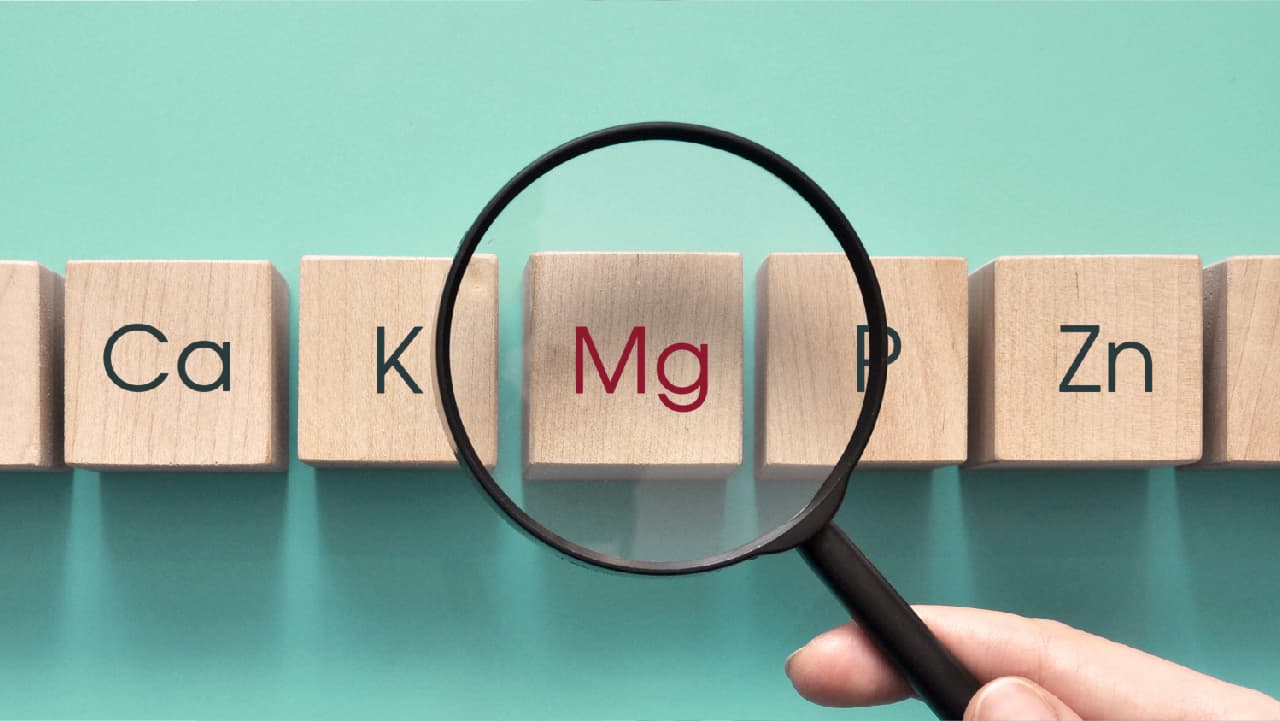If you’re struggling to control your weight, it might be down to your magnesium levels.
10-30% of adults have a magnesium deficiency. And with studies showing a link between magnesium levels and body mass index (BMI), if you’re looking to lose weight, it could be worth exploring ways to get more into your diet.
In this piece we’ll look at magnesium’s impact on your weight loss goals.
What is Magnesium?

Magnesium, an essential mineral, is vital for over 300 biological functions in the body, including muscle and nerve function, protein synthesis, blood glucose control, and blood pressure regulation. All of which, are crucial for healthy weight management.
The Recommended Dietary Allowance (RDA) for magnesium is 420 mg for men and 320 mg for women. 1
However, achieving this RDA through diet alone can be challenging. With 48% of adults in the U.S. not meeting their daily magnesium needs.
Magnesium and Weight Loss: Does it Work?
It might not be the first nutrient you think of when it comes to weight loss. But there are studies to suggest magnesium supplementation may help you lose weight. Magnesium helps improve risk factors for overweight and obesity, such as blood sugar control, blood pressure levels, and sleep quality.
One study from 2012 found that overweight or obese people who took a magnesium supplement to help control insulin and glucose levels also experienced less bloating and water retention. And ultimately lost weight. 2
This was attributed to magnesium’s ability to act as a diuretic that flushes excess fluid from the body. But there are other ways magnesium might play a role in weight management.

Magnesium Deficiency and Obesity: Is there a connection?
Research indicates a potential link between magnesium deficiency and obesity, though the exact mechanisms remain unclear.
Studies show that increased magnesium intake correlates with lower BMI, waist circumference, and blood sugar levels, suggesting a role in mitigating obesity factors. 3
One study of over 1,500 adults found a higher magnesium intake associated with reduced body measurements. Another meta analysis on younger individuals noted a lower incidence of metabolic syndrome, 4 a condition tied to obesity, with higher magnesium consumption.
They found a significantly lower incidence of metabolic syndrome, including weight problems. 5
How Magnesium May Support Weight Loss
Magnesium is a versatile mineral that does a lot for overall health -- including supporting several biological pathways that can help you reach your weight loss goals. Let's take a look at those.
Magnesium, Glucose Metabolism and Insulin Balance
Insulin is a hormone responsible for regulating blood sugar, which in turn helps with weight loss efforts.
- Insulin sensitivity refers to cells' ability to efficiently respond to insulin. Good insulin sensitivity facilitates glucose uptake from the bloodstream for proper energy utilization and blood sugar regulation.
- Insulin resistance is the opposite of insulin sensitivity. It is a condition where cells become less responsive to the effects of insulin. This leads to elevated and unstable glucose levels in the bloodstream, which makes it much harder to lose weight.
Obesity is closely linked to insulin resistance. Carrying excess pounds, especially around the abdomen, promotes inflammation that disrupts insulin signaling. As fat continues to pile on, the body needs more and more insulin to maintain blood sugar control.
Researchers have noted that magnesium deficiencies appear to be associated with insulin resistance in obese children. Researchers further pointed out that magnesium supplementation or increasing intake of magnesium rich foods may be important for helping obese children, especially in the context of blood sugar control later in life. 6
Magnesium and Sleep

Sleep problems are strongly associated with obesity. This is another aspect of wellness where magnesium can help. Magnesium has a few different bioactivities that encourage deep restful sleep.
- Magnesium has a calming effect on the entire central nervous system.
- It also plays a role in relaxing muscles which can soothe the whole body in preparation for sleep.
All of these factors make it hard to fall asleep, stay asleep and get good sleep quality:
Magnesium-deficient people may be more likely to have sleep problems. Researchers suggest that suboptimal magnesium levels, which do not reach the low levels of magnesium deficiency, may still cause negative effects such as restless sleep and multiple nighttime awakenings. 7
Magnesium supplements can act as natural sleep aids, making it easier to fall and stay asleep.
Some research backs up magnesium's potential as a sleep aid. Researchers have suggested it may help to improve: 8
- Sleep efficiency
- Total sleep time
- Sleep onset latency
- Waking up too early
Magnesium bisglycinate supports restful sleep, which in turn may indirectly help to promote weight loss.
Magnesium and testosterone
Testosterone plays a role in helping people to lose weight. Researchers have discovered that in men with low testosterone, starting testosterone therapy produces significant and sustained weight loss, marked reduction in waist circumference and BMI and improvement in body composition. 9
Magnesium is important for healthy testosterone production.
Magnesium and cell energy production
Magnesium plays a key role in producing cellular energy, crucial for burning calories and losing weight.
Some researchers have suggested cellular bioenergetics as an emerging area of study for losing weight. 10
Cellular energy production is helpful if you want to exercise regularly, burning off calories and promoting fat loss. Sufficient magnesium can help maintain the cell energy you need for weight loss.
Should You Take a Magnesium Supplement?
Many adults fail to get enough magnesium. So whether you're trying to lose weight or not, it's wise to increase your magnesium intake through diet and supplements.

Here are some of the best dietary sources of magnesium:
- Spinach: 1 cup contains 157 mg.
- Almonds: 1 ounce provides 80 mg.
- Cashews: 1 ounce contains 82 mg.
- Pumpkin seeds: 1 ounce has 150 mg.
- Black beans: 1 cup contains 120 mg.
- Avocado: 1 medium-sized fruit provides 58 mg.
- Salmon: 3 ounces of cooked salmon contains 26 mg.
- Brown rice: 1 cup contains 86 mg.
- Yogurt: 1 cup provides 47 mg.
- Banana: 1 medium-sized banana contains 32 mg.
Remember that these values can vary slightly depending on factors like growing conditions and processing methods.
Magnesium supplementation is another option for reversing magnesium deficiency.
Consider These Magnesium Supplements for Weight Loss
If you're seeking a quality magnesium supplement to complement your weight loss regimen, consider adding a premium supplement such as Performance Lab® NutriGenesis® Multi or Sleep to your supplements regimen.
Performance Lab® NutriGenesis® Multi

NutriGenesis® is the cleanest, healthiest and easiest-to-absorb multivitamin supplement ever developed.
NutriGenesis® supplies premium nutritional support for optimal health and whole-body performance, including support for healthy weight management.
NutriGenesis® vitamins and minerals are molecularly identical to the nutrients found in whole foods, including those magnesium-rich foods we just mentioned.
Because they're identical, NutriGenesis® nutrients are easy for the body to recognize, enhancing their absorption and bioavailability.
- Supplies 27 nutrients, including magnesium, calcium, vitamin D and more, with 17 of these vitamins and minerals hitting 100%+ Daily Value
- NutriGenesis® doesn't use any hard-to-absorb synthetic nutrients or isolated nutrient forms that are found in cheaper multivitamin products
- Delivered in 100% plant-based, prebiotic-infused, gluten free NutriCaps® for digestive health and comfort
- Ultraclean Performance Lab® design: No synthetic additives, colors or preservatives of any kind. Dairy free, gluten free and non-GMO.
- High quality. Undergoes third party testing for reliable, precise nutrient intake.
- Contributes to ideal magnesium levels in conjunction with a healthy diet
By incorporating a premium quality multivitamin like Performance Lab® NutriGenesis® Multi into your daily regimen, you can help maintain how much magnesium you need for weight loss.
Performance Lab® Sleep

Performance Lab® Sleep is a natural bedtime formula designed to promote relaxation and overnight rejuvenation without grogginess.
It's formulated with plant extracts, amino acids and highly bioavailable magnesium to provide full sleep support.
- CherryPURE® Montmorency tart cherry, 500 mg
- TryptoPure™ L-Tryptophan, 200 mg
- Magnesium Bisglycinate, Taurate and NutriGenesis®, 100mg
Thanks to natural melatonin and serotonin support, Sleep helps you to:
- Relax the central nervous system (CNS) and muscles at bedtime
- Fall asleep quickly
- Soothe away joint aches and muscle spasms
- Extends the deepest, most mind-body regenerative phases of sleep
Plus, this supplement is safe, natural and non-habit-forming. It has none of the groggy synthetic side effects associated with typical OTC sleep products.
Conclusion
Magnesium is one of the most important minerals, with one of the longest lists of health benefits. And magnesium and weight loss may be more closely linked than many people realize.
If you are striving to lose weight, a magnesium supplement may help. Research suggests that magnesium deficiency appears to be associated with overweight and obesity.
While science has not yet pinpointed how it may help, magnesium improves several pathways related to weight loss, including blood sugar, energy metabolism, sleep and more. Magnesium helps improve several pathways related to weight loss, including blood sugar control, energy metabolism, and sleep quality.
Foods and magnesium supplements contribute to the magnesium levels you need to reverse weight gain, promote weight loss and otherwise support overall wellness on your weight loss journey.














